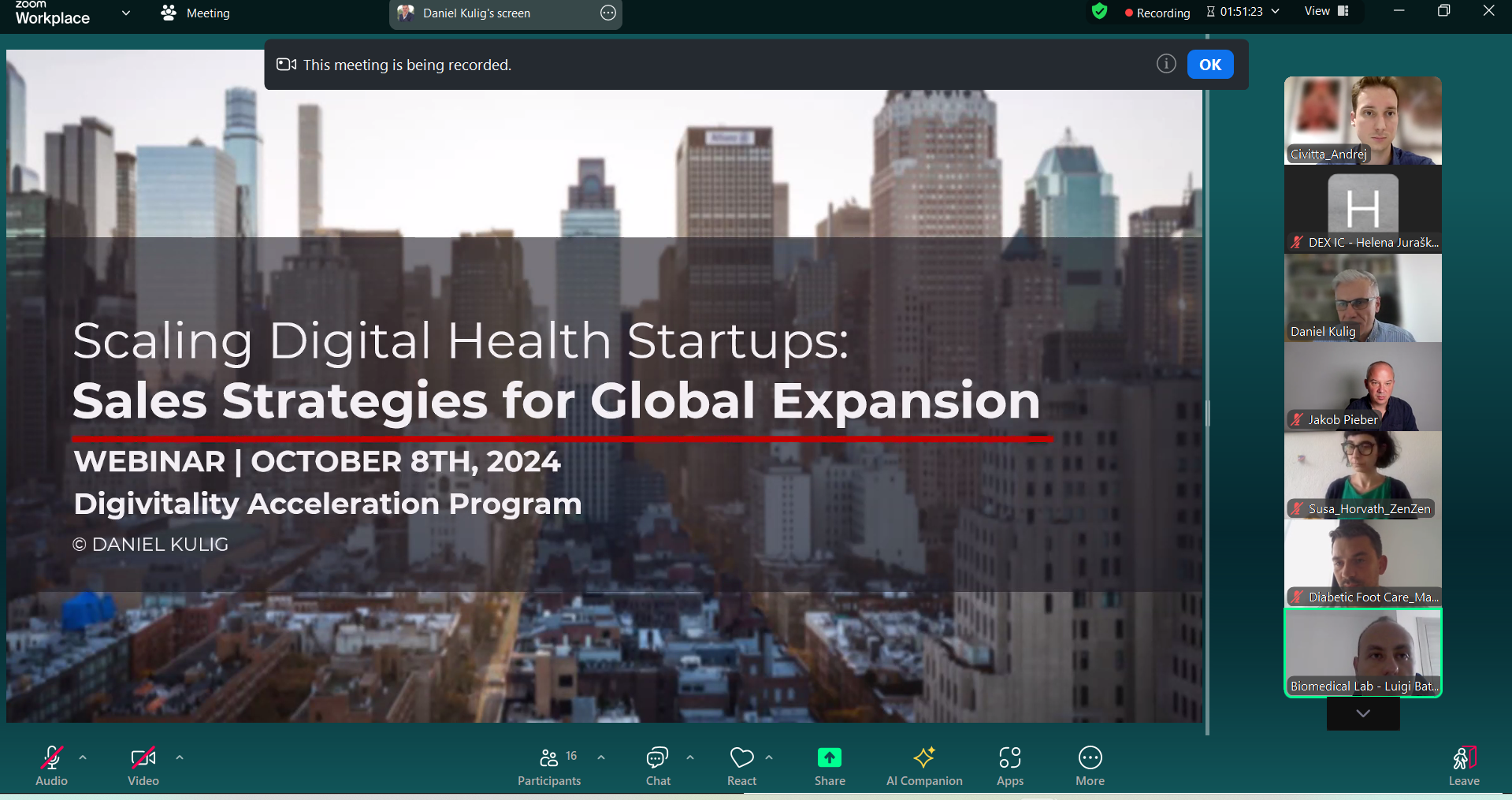As part of the DIGIVITALITY Programme, a series of expert-led workshops were designed to provide startups with the knowledge and tools needed to scale in the healthcare and digital health sectors. These sessions focused on go-to-market strategies, sales development, product validation, and regulatory compliance. Led by experienced professionals, the workshops combined theoretical insights with practical recommendations, helping founders refine their business models, strengthen market positioning, and navigate the complex healthcare ecosystem.
The first workshop, held on September 12, 2024, was led by Henrik L. Ibsen, a pioneer in eHealth and virtual care. He shared his expertise on go-to-market strategies, emphasizing that success in healthcare requires more than just an innovative product—it demands a deep understanding of regulatory constraints, stakeholder expectations, and long sales cycles. Startups learned that a well-structured go-to-market strategy is essential for long-term success and that customer segmentation and strategic partnerships play a crucial role in accelerating growth. Henrik encouraged founders to critically assess their market entry strategy, ensuring they build a scalable and sustainable foundation for their healthcare solutions.
The second workshop, held on October 8, 2024, was led by Daniel Kulig, an experienced startup mentor and angel investor. His session focused on sales strategies and exit planning, highlighting the unique challenges of selling healthcare solutions, where trust-building, regulatory approval, and engagement with key decision-makers significantly influence the sales cycle. Unlike other tech startups, healthcare startups must establish credibility with hospitals, public institutions, and private healthcare providers before gaining significant market traction. Daniel also stressed the importance of early exit planning, explaining that startups should consider potential mergers, acquisitions, or strategic partnerships early in their journey. Thinking ahead and aligning business goals with an eventual exit strategy helps create a strong foundation for sustainable growth and investment attraction.
The third workshop, led by Aljaž Podboršek, took place on November 7, 2024, and focused on product validation and regulatory compliance. As an expert in quality assurance and regulatory standards, Aljaž guided startups through the key regulatory frameworks governing healthcare products, including MDR, FDA, and ISO 13485 compliance. He emphasized that regulatory compliance is not just a requirement but a competitive advantage for startups entering the healthcare market. The session covered best practices for certification, risk management strategies, and validation techniques to support startups in navigating the approval process. Aljaž also addressed cybersecurity and risk management in medtech, particularly for AI-driven and data-intensive healthcare solutions.
The final workshop in the series took place on November 25, 2024, and was led by experts from GE HealthCare, focusing on various aspects of product validation and healthcare innovation. János Varró provided insights into design validation for medical devices, showing startups how to ensure regulatory compliance from the early development stages. Tamás Boros highlighted the importance of early validation, explaining how testing and verification at the beginning of the development cycle can streamline regulatory approval and prevent costly redesigns. Pál Tegzes explored the validation of AI-driven healthcare products, emphasizing the importance of data integrity, transparency, and compliance with evolving AI regulations. Lőrinc Kiss presented on human-centered design in medical technology, demonstrating how usability and intuitive design enhance adoption rates and improve patient outcomes.
The DIGIVITALITY workshops reinforced the critical role of validation, compliance, and strategic sales planning in building a successful healthcare startup. A recurring theme across all sessions was the need to integrate regulatory and market considerations early in the development process, ensuring startups avoid costly delays and maximize their chances of success. Founders were encouraged to leverage expert insights, refine their business models, and actively seek partnerships that will support their scaling efforts. As the DIGIVITALITY Programme progresses, startups are encouraged to apply these insights, engage with mentors, and take advantage of one-on-one expert sessions to further refine their strategies. By integrating these lessons into their operations, they will be better positioned for market success, investment readiness, and long-term impact in the healthcare sector.
